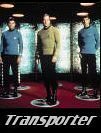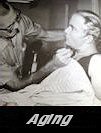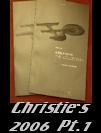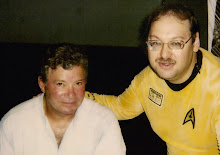A particularly well done and insightful article by Charlie Jane Anders, published on io9.com today as a review of "These Are The Voyages: TOS - Season Three" by Marc Cushman ...
The original Star Trek
was a revolutionary television show... that came to an ignominous end.
The classic space opera saw a huge drop in quality in its final season,
and then was cancelled. Legend has it the ratings were terrible, and the
new producer, Fred Freiberger, ruined it. But the truth is a bit more
complicated.
As with the first two volumes of the series, Cushman gives a really complete overview of the state of Star Trek at the start of the season, as well as at a few places in the middle and end of the season. There's a lot of attention to Trek's
place in the zeitgeist, and how the show was actually being talked
about at the time. And then he goes through episode-by-episode,
exploring how the story was developed from proposal to screen.
And this
volume has the most impact if you've already read volumes one and two —
readers of the first two books will know just how much attention and
thought went into every single Star Trek script. And how much
the stories were changed, sometimes for the worse but frequently for the
better. A lot of the best writing on Star Trek was actually
re-writing, with a cadre that included Gene Coon, Dorothy Fontana,
creator Gene Roddenberry and a few others paying intense attention to
every detail and keeping the characters consistent and believable.
With the
third season, all of those people are gone — except Roddenberry, who's
tossing in edicts from on high, but then not sticking around to make
them work.
As with the first two volumes of These Are The Voyages, Cushman goes out of his way to demolish fan lore about the show. Chiefly, the idea that Trek always got terrible ratings, and it was a miracle the show ever stayed on the air. Though Trek
was moved to the Friday night "death slot," it continued to be popular
for much of the third season — "Spock's Brain," the season opener, won
its time slot, and the show came in second for several episodes after
that.
The real villain behind Trek's cancellation: Jerry Lewis
And in fact, reading this book, you learn a surprising culprit behind the doom of Star Trek: comedian Jerry Lewis. Actually, comedy in general hurt Trek — the show lost its planned Monday 8 PM time slot because the network wanted to keep the popular Laugh-In at that time.
But in November 1968, NBC was having second thoughts about burying Trek
on Friday nights at 10 PM, when few young people could watch it. (And
the show was also not shown on a number of NBC stations, which chose to
show the Grand Ole Opry on Friday nights instead.)
And there was an alternative. NBC was showing The Jerry Lewis Show on Tuesday in the early evening, and Lewis' show was a ratings disaster. So NBC decided to swap the two shows around, giving Trek
a prime early evening slot and burying Lewis on Friday nights. But
Jerry Lewis and his agents at William Morris went into what Variety
called "a frenzy" at the time, and they managed to invoke a contractual
clause that would cost NBC a lot of money if the show was moved, by
forcing NBC to buy them out.
NBC wasn't
willing to spend that much money just to pay off Jerry Lewis, so it kept
the show in its prime slot, and kept Star Trek in its terrible
position.
But who's to blame for the declining quality?
There's a whole lot of blame to go around for the drop-off in Star Trek's
scripts in its final season. The studio was slashing the show's budget,
meaning more "bottle" episodes set on board the Enterprise (while the
network, meanwhile, was angrily demanding more episodes set on planets.)
The
producers tried to push the show in a more adult, thoughtful direction,
but ran into network interference — the behind-the-scenes story of "And
the Children Shall Lead" is particularly sad. The show was originally
going to be brutally bleak, with much more emphasis on mass suicide and
much more psychotic, terrifying kids. But the network balked, and then
the producers cast famous attorney Melvin Belli as Gorgan the evil
angel, instead of hiring an actual actor.
But the usual scapegoat for the drop-off in Star Trek's
quality is Fred Freiberger, who took over as producer from Gene
Roddenberry. Cushman's book is certainly full of quotes from people like
Leonard Nimoy and James Doohan, who placed the blame firmly on
Freiberger.
Freiberger
himself is quoted, from a 1991 interview, as saying "I thought the worst
experience of my life was when I was shot down over Nazi Germany. A
Jewish boy from the Bronx parachuted in to the middle of 80 million
Nazis. Then I joined Star Trek. I was only in a prison camp for two years, but my travail with Star Trek has lasted 25 years... and counting."
But after reading Cushman's book, to the extent that a single person winds up shouldering the vast majority of the blame for Trek's
drop in quality, it's creator Gene Roddenberry, who abandoned the show
in a fit of pique after the network reneged on that prized Monday early
evening time slot.
Roddenberry
had already ordered a number of scripts for the third season (several
of which turned out to be unworkable) and then made a series of
impossible decisions that his replacement, Freiberger, had to live with.
Roddenberry also strung producer Robert Justman along, leading Justman
to believe he was going to be Roddenberry's replacement, and then let
him down. It was Roddenberry who hired story editor Arthur Singer, who
seemed somewhat baffled by Star Trek, and meanwhile Roddenberry
didn't make much effort to keep Dorothy Fontana around, when she could
have been convinced to stay on. Roddenberry kept pushing unworkable
story ideas (like his prized "world where blacks enslave whites" idea.)
Most of
all, Roddenberry enjoyed his antagonistic relationship with NBC,
encouraging the fans to "twist the peacock's tail," and created an
environment where network executives loathed Star Trek because of its creator.
And for his part, Freiberger had some good ideas for Star Trek,
that he lacked either the time or the ability to implement. He wanted
to develop the supporting cast further, including Chekov and Scotty. He
wanted more serious, relationship-based drama, and stronger female
characters — one of Freiberger's main initiatives as producer was to
hire three new female writers, in addition to Margaret Armen and Dorothy
Fontana.
Roddenberry
was going through a bitter divorce, and was frantically trying to get a
movie-writing career off the ground (doing a new version of Tarzan).
And while he was neglecting Star Trek, he was also hanging Freiberger out to dry, bad-mouthing his replacement in letters to people like John W. Campbell.
There's a bizarre moment in the middle of These Are The Voyages Volume Three. One of the show's producers, Eddie Milkis, decided to go to Roddenberry's office and "nail him." Milkis recounts:
I
called him, told him I wanted to come speak with him, and then I went to
his office to chew his ass out and to tell him that I thought he was
letting everybody down... I went in there and I said, 'Gene, we've got
tremendous script problems, and I really think Fred Freiberger could use
your help.' Now, as I continue talking, out of the back of Gene's
office comes Nichelle Nichols, who's wearing one of Gene's long cardigan
sweaters, and NOTHING ELSE! No shirt, no pants, nothing... So now
Nichelle says something like, 'Oh, I'm sorry, Eddie, I didn't know you
were there.' I'm immediately going red and I'm completely flustered
until I notice that Gene's just kind of sitting at his desk, smiling and
enjoying the embarrassed look on my face.
Seeing how the sausage is made
What's fascinating, and somewhat depressing, is just how many of the mediocre-to-terrible stories in Star Trek's
third year started out as brilliant story ideas. Or at the very least,
stories that everybody involved thought were going to be great.
("Spock's Brain" was envisioned as a serious look at the hot-button
topic of organ transplantation, for example, albeit one laced with
humor. In the end, the humor got cut and the serious stuff became
unintentionally funny.)
Reading this book, you can actually see the stories get worse, and
everybody who was excited about them become more and more depressed, as
they go through rewrites and network notes. (See above for the sad story
of "And the Children Shall Lead.")
It's also
fascinating to read about the development of "The Enterprise Incident,"
in which writer Dorothy Fontana had a huge falling out with the new
production team. Freiberger had dropped Spock's father, Sarek, from the
script, and changed the Romulan commander to a woman. And it was
Freiberger and Arthur Singer who decided to add Spock romancing the
Romulan, although Singer wrote it as a scene where Spock says "I adore
you," before "raining kisses on every square inch above her shoulder."
Fontana
fired back an incensed memo, saying "We have established Vulcans do not
nuzzle, kiss, hug, or display any other form of human affection... The
Commander had jolly well be suspicious if Spock starts slobbering all
over her." Nimoy, also, wrote directly to Gene Roddenberry complaining
about Spock's "oversexed" behavior.
Also, "The
Enterprise Incident" script lost several scenes that explained just why
people were able to beam from the Enterprise to the Romulan ship and
back, when their shields were supposed to be up.
Which is
the other interesting thing that comes through in this book: Nimoy was
zealous about the integrity of Spock, and frequently butted heads with
the new producers over how the character was portrayed. But as James
Doohan put it, William Shatner put himself out there to make the show
better and shoot down some of the sillier ideas in general: "Leonard was
more interested in [protecting] the character of Spock. I think Bill
was more interested in the series."
In the end, the only person who really believed, in his heart, that Star Trek would get a fourth season was James Doohan. He couldn't accept that such a smart, well done show would be pulled off the air.
These Are The Voyages: TOS - Season Three is now in stock and available for purchase at Amazon.com at the following link:
Amazon-TATV3



































































































